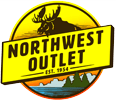There’s something truly magical about packing up your car and heading out into the great outdoors for a weekend of car camping. Whether you’re surrounded by majestic mountains, serene forests, or a tranquil lakeside, car camping provides an incredible opportunity to spend quality time with family and friends while immersing yourself in the beauty of nature. The simple pleasures of gathering around a campfire, cooking up delicious meals under the open sky, and sleeping beneath a canopy of stars make car camping a cherished experience for many.
However, the key to a successful and enjoyable car camping trip lies in proper preparation. Going on an outdoor adventure without the right gear or essentials can turn a relaxing getaway into a stressful ordeal. That’s why we’ve put together the ultimate car camping checklist, designed to help you plan and pack everything you need for a comfortable and memorable weekend in the great outdoors. By following this comprehensive guide, you can focus on what really matters: creating unforgettable memories and soaking in the wonders of nature.
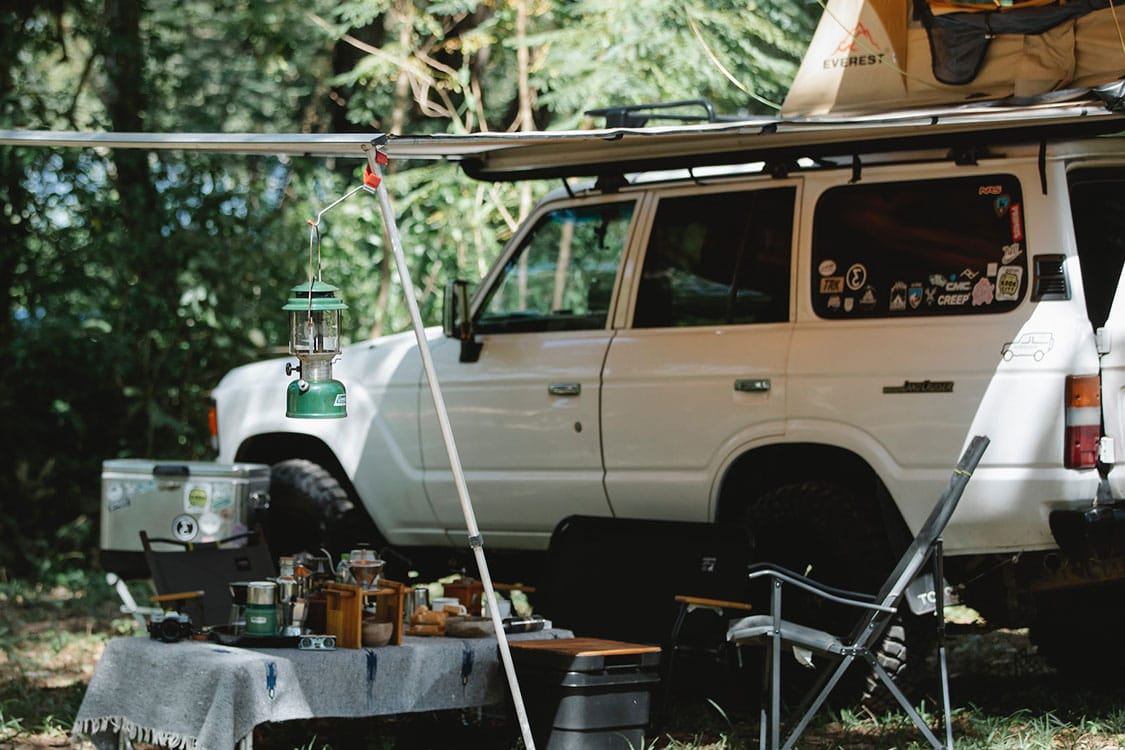
Shelter and Sleeping Gear
Ensuring a good night’s sleep and protection from the elements is crucial for any car camping adventure. A well-prepared shelter and sleeping setup will allow you to recharge after a day of exploring and be ready for another day of fun. Here’s a detailed breakdown of the essential shelter and sleeping gear you’ll need:
Tent (with stakes and guylines)
A reliable and weather-appropriate tent is the cornerstone of your car camping shelter. Consider the size of your group and the expected weather conditions when choosing a tent. Look for features such as waterproofing, ventilation, and ease of setup. Don’t forget to pack the stakes and guylines to secure your tent in windy conditions. Take a look at a selection of tents in our online store.
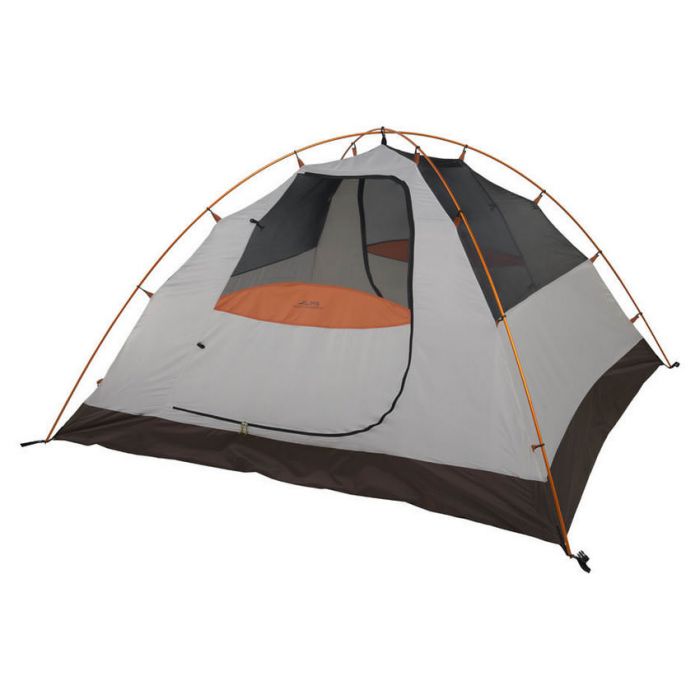
Tarp or footprint (for under the tent)
A tarp or tent footprint protects the bottom of your tent from moisture, sharp objects, and abrasion. It can also help keep your tent clean and prolong its lifespan. Make sure the tarp or footprint is the appropriate size for your tent and doesn’t extend beyond the tent’s edges, as that can cause water to pool underneath.
Sleeping bags (appropriate for the season)
Choose a sleeping bag that’s suitable for the temperature range you’ll be experiencing during your trip. Sleeping bags are usually rated by temperature, with options for summer, three-season, and winter camping. Opt for a slightly warmer bag if you tend to get cold easily or if you expect cooler nights.
Sleeping pads or air mattresses
A sleeping pad or air mattress provides insulation and cushioning between you and the ground, improving your comfort and sleep quality. Sleeping pads come in various types, such as foam, self-inflating, and inflatable. Air mattresses offer more cushioning, but may require a pump for inflation. Consider factors like size, weight, and insulation when making your choice.
Pillows
Don’t underestimate the importance of a good pillow for a restful night’s sleep. You can bring a pillow from home or opt for a camping-specific pillow that’s compact and lightweight.
Extra blankets (for colder nights)
Having an extra blanket or two can provide added warmth and comfort, especially if temperatures drop unexpectedly during the night. They can also double as picnic blankets or serve as additional seating around the campfire.
Cooking and Food Supplies
Preparing food outdoors can be a fun and rewarding activity, but it requires some planning and the right supplies. Here’s a detailed breakdown of the essential cooking and food items you’ll need for your car camping trip: Portable camping stove or grill: A portable stove or grill is essential for cooking hot meals at your campsite. Options range from compact backpacking stoves to larger propane grills. Consider factors such as fuel type, cooking surface size, and weight when choosing the right stove or grill for your needs.
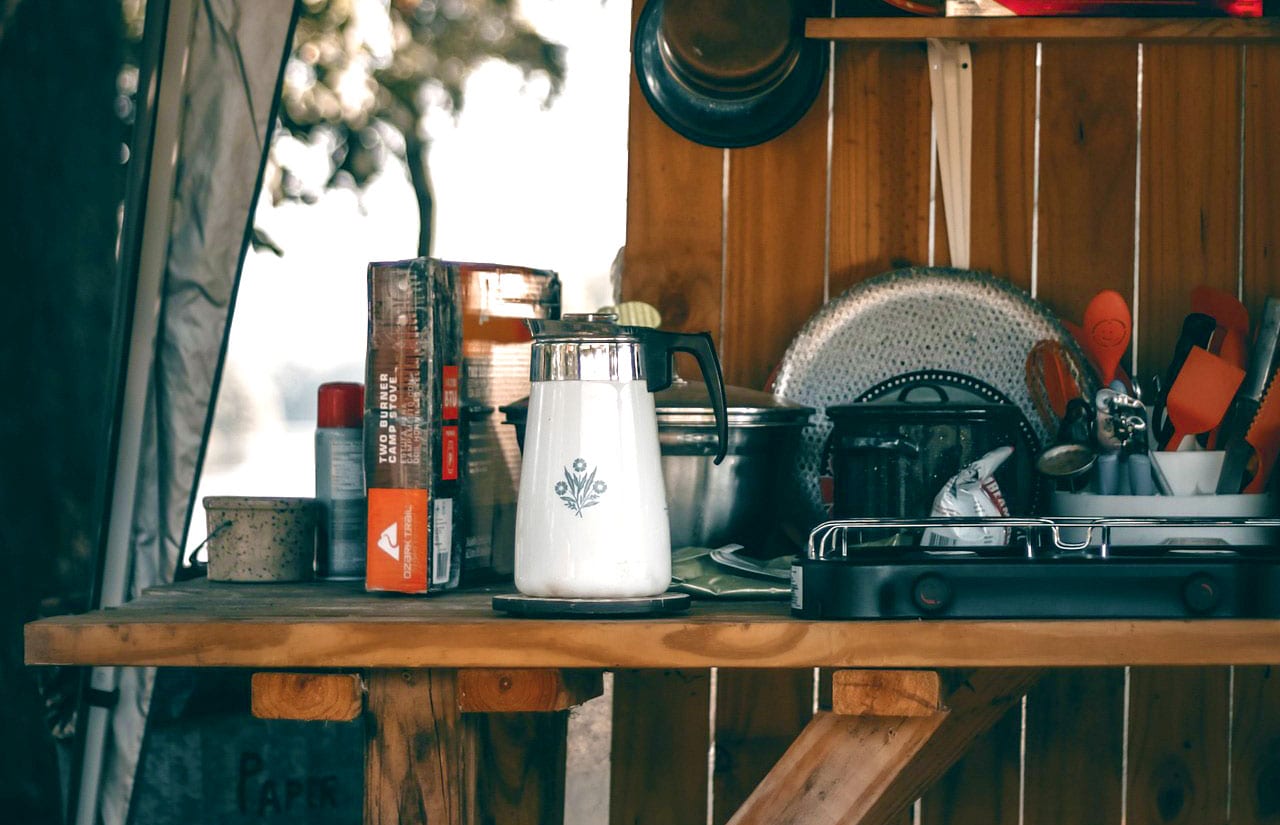
Cooking Essentials
- Fuel for the stove or grill: Don’t forget to pack enough fuel for your cooking device. Common fuel types include propane, butane, and white gas. Check your stove or grill’s specifications for the recommended fuel type and amount needed for your trip duration.
- Cooking utensils (pots, pans, spatula, etc.): Bring a set of cookware suitable for your camping menu. This may include pots, pans, a spatula, tongs, and a ladle. Opt for lightweight and durable materials, such as aluminum or stainless steel, and choose nesting sets for easy packing.
- Plates, bowls, and eating utensils: Pack reusable plates, bowls, and eating utensils for each camper. Consider materials like stainless steel, melamine, or lightweight plastic that are durable and easy to clean. You can also choose camping-specific tableware that’s designed to nest or stack for efficient packing.
- Cups or mugs: Don’t forget cups or mugs for hot and cold beverages. Insulated mugs are a great option, as they keep hot drinks warm and cold drinks cool for longer periods.
- Cooler with ice or ice packs: A cooler is essential for keeping perishable food items fresh during your trip. Choose a cooler size appropriate for your group and the duration of your trip, and pack it with ice or reusable ice packs to maintain a consistent temperature.
Food
- Non-perishable food items (canned goods, pasta, etc.): Stock up on non-perishable food items like canned goods, pasta, rice, and granola bars that have a long shelf life and require minimal preparation. These items provide a reliable food source and can be easily stored in your car.
- Fresh food (fruits, vegetables, meats): Bring fresh food like fruits, vegetables, and meats for more nutritious and diverse meal options. Store these items in your cooler and plan your meals to consume perishable items first to avoid spoilage.
- Condiments and spices: Enhance the flavor of your camp meals with a selection of condiments and spices. Pack small containers or use a camping-specific spice kit for convenience.
- Cooking oil or non-stick spray: Don’t forget cooking oil or non-stick spray to prevent food from sticking to your cookware and make cleanup easier.
Other
- Biodegradable soap and sponge for dishwashing: Cleaning your dishes is essential for maintaining hygiene at your campsite. Bring biodegradable soap and a sponge or scrub brush to wash your cookware and tableware after each meal.
- Trash bags: Pack trash bags to collect and store your waste, ensuring that you leave your campsite clean and adhere to Leave No Trace principles.
Clothing and Personal Items
Dressing appropriately and packing the right personal items are essential for comfort and safety during your car camping adventure. Weather conditions can change quickly in the outdoors, so it’s important to be prepared for various scenarios. Here’s a detailed breakdown of the essential clothing and personal items you’ll need for your trip:
Weather-appropriate clothing (including rain gear and extra layers)
Pack clothing suitable for the expected weather conditions, such as moisture-wicking base layers, insulating mid-layers, and weatherproof outer layers. Bring extra layers for added warmth, as temperatures can drop significantly at night. Don’t forget rain gear, like a waterproof jacket and pants, to stay dry in case of unexpected showers.
Hiking boots or sturdy shoes
Footwear is crucial for your comfort and safety during outdoor activities. Choose hiking boots or sturdy shoes with good traction and support for walking or hiking on uneven terrain. Break in new footwear before your trip to avoid blisters and discomfort.
Sandals or flip-flops (for around the campsite)
Pack a pair of lightweight sandals or flip-flops for use around the campsite. These can provide relief from your hiking boots, allow your feet to breathe, and make it easy to slip on and off when entering or exiting your tent.
Hat and sunglasses
Protect yourself from the sun with a wide-brimmed hat or cap and sunglasses. A hat can shield your face and neck from harmful UV rays, while sunglasses protect your eyes and reduce glare.
Toiletries (toothbrush, toothpaste, soap, etc.)
Maintain personal hygiene during your trip by packing essential toiletries, such as a toothbrush, toothpaste, biodegradable soap, shampoo, and any other personal care items you may need.
Towels
Bring quick-drying microfiber towels for drying off after swimming or washing up. They are lightweight, compact, and can be easily hung to dry at your campsite.
Insect repellent
Ward off mosquitoes and other insects with an effective insect repellent. Options include sprays, lotions, or wearable devices. Choose a product with an appropriate concentration of active ingredients, such as DEET or picaridin, for your needs.
Sunscreen
Protect your skin from sunburn by applying a broad-spectrum sunscreen with an SPF of at least 30. Reapply every two hours or after swimming or sweating.
Personal medications
Don’t forget any prescription medications or over-the-counter remedies you may need during your trip. Pack them in a waterproof container or plastic bag to keep them safe and dry.
Campsite Essentials
Setting up a comfortable and functional campsite is crucial for a successful car camping experience. The right gear and supplies can help you create a welcoming space to relax, cook, and sleep after a day of exploration and adventure. Here’s a detailed breakdown of the essential campsite items you’ll need for your trip:
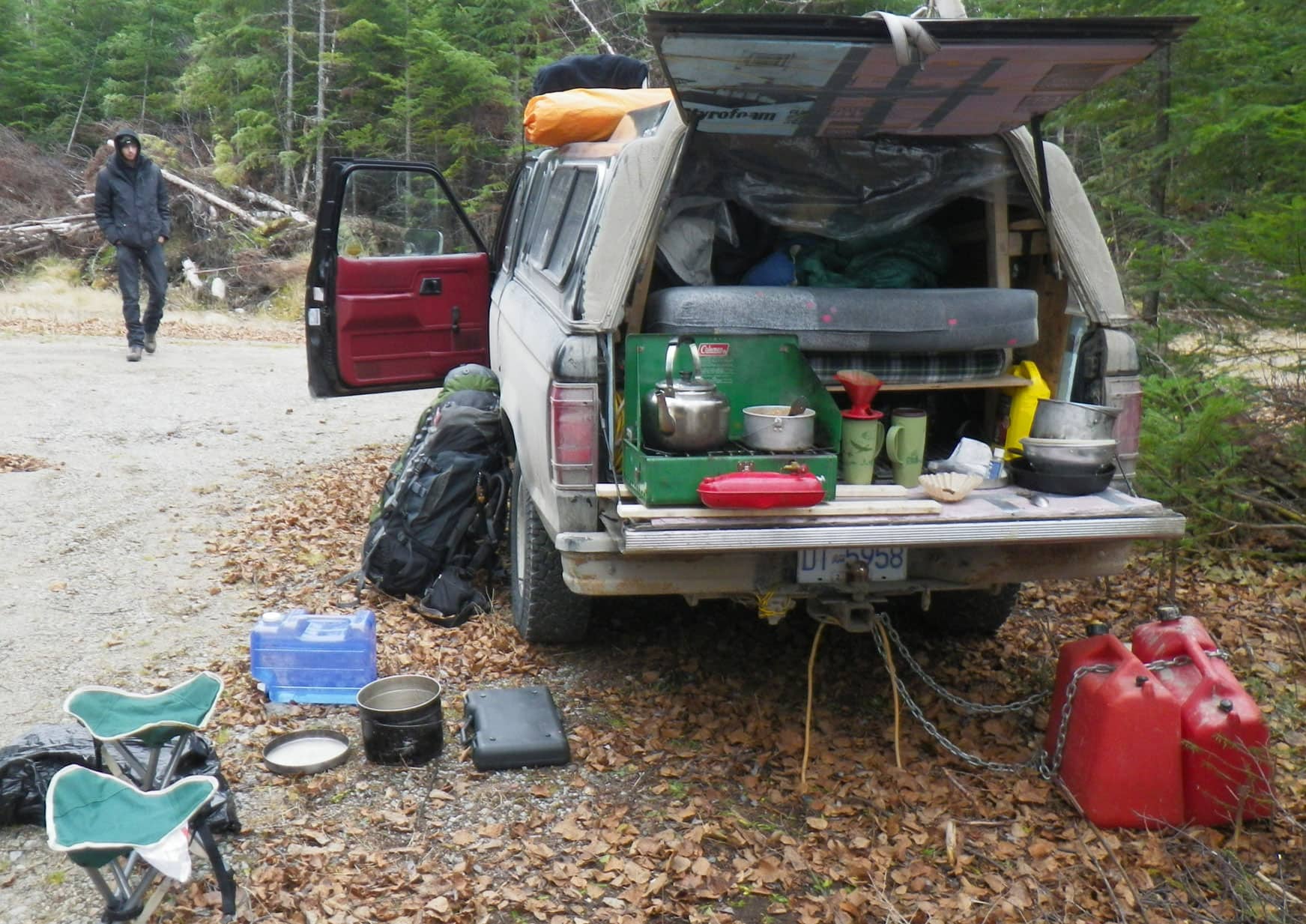
Seats and Tables
- Folding chairs or portable seating: Bring comfortable seating options for your campsite, such as folding chairs or portable camping stools. These provide a place to relax, eat meals, and socialize around the campfire.
- Camping table (if not provided at the site): A portable camping table can be a valuable addition to your campsite, providing a stable surface for cooking, eating, and other activities. Choose a lightweight, collapsible table that’s easy to transport and set up.
Lights
- Headlamps or flashlights (with extra batteries): Ensure you have adequate lighting for your campsite by packing headlamps or flashlights. These can help you navigate your site safely and efficiently after dark. Don’t forget to pack extra batteries or a charger if needed.
- Lantern or portable light source: A lantern or other portable light source can provide ambient lighting for your campsite, making it easier to cook, play games, or read at night. Options include battery-powered, solar-powered, or rechargeable lanterns.
Fire
- Fire starter (matches, lighter, or firestarter): Bring a reliable fire starter to ignite your campfire or camping stove. Options include matches, lighters, or firestarter sticks. Store these items in a waterproof container to keep them dry and functional.
- Firewood or campfire supplies (check local regulations): If campfires are allowed at your destination, pack firewood or other campfire supplies. Check local regulations regarding firewood transportation and campfire restrictions, as some areas may have specific rules or require a permit.
Handy Tools and Life-Savers
- Multi-tool or camping knife: A multi-tool or camping knife is a versatile piece of gear that can be used for various tasks around the campsite, such as cutting rope, opening cans, or preparing food. Look for a durable and compact option that includes essential tools like a knife, scissors, and bottle opener.
- Map and compass (if exploring the area): If you plan to hike or explore the surrounding area, bring a map and compass to help you navigate and avoid getting lost. Familiarize yourself with the basics of map reading and compass use before your trip.
- First-aid kit: A well-stocked first-aid kit is essential for addressing minor injuries and ailments that may occur during your car camping trip. Include items such as adhesive bandages, gauze, pain relievers, antiseptic wipes, tweezers, and any other supplies you may need based on your specific activities and needs.
Entertainment and Extras
Relaxing
- Hammock: A portable hammock can be a welcome addition to your campsite, providing a comfortable spot to relax, read, or nap. Look for a lightweight and compact hammock that can be easily hung between trees or with a portable stand.
- Books, magazines, or e-readers: Bring reading material to enjoy during quiet moments at the campsite, such as books, magazines, or an e-reader. Reading can provide a relaxing escape and a way to unwind after a day of outdoor activities.
Having Fun
- Board games, card games, or puzzles: Pack a selection of board games, card games, or puzzles to enjoy with your fellow campers. These activities can provide hours of entertainment and foster camaraderie among your group.
- Portable speakers or music player: Bring a portable speaker or music player to enjoy your favorite tunes at the campsite. Be mindful of noise levels and respect other campers by keeping the volume at a reasonable level, especially during quiet hours.
- Camera or smartphone for capturing memories: Document your car camping adventure with a camera or smartphone. Capture the beauty of your surroundings and snap photos of memorable moments to share and reminisce about later.
- Sports equipment or outdoor games: Pack sports equipment or outdoor games like frisbees, soccer balls, or a portable badminton set to engage in active play and make the most of your outdoor setting.
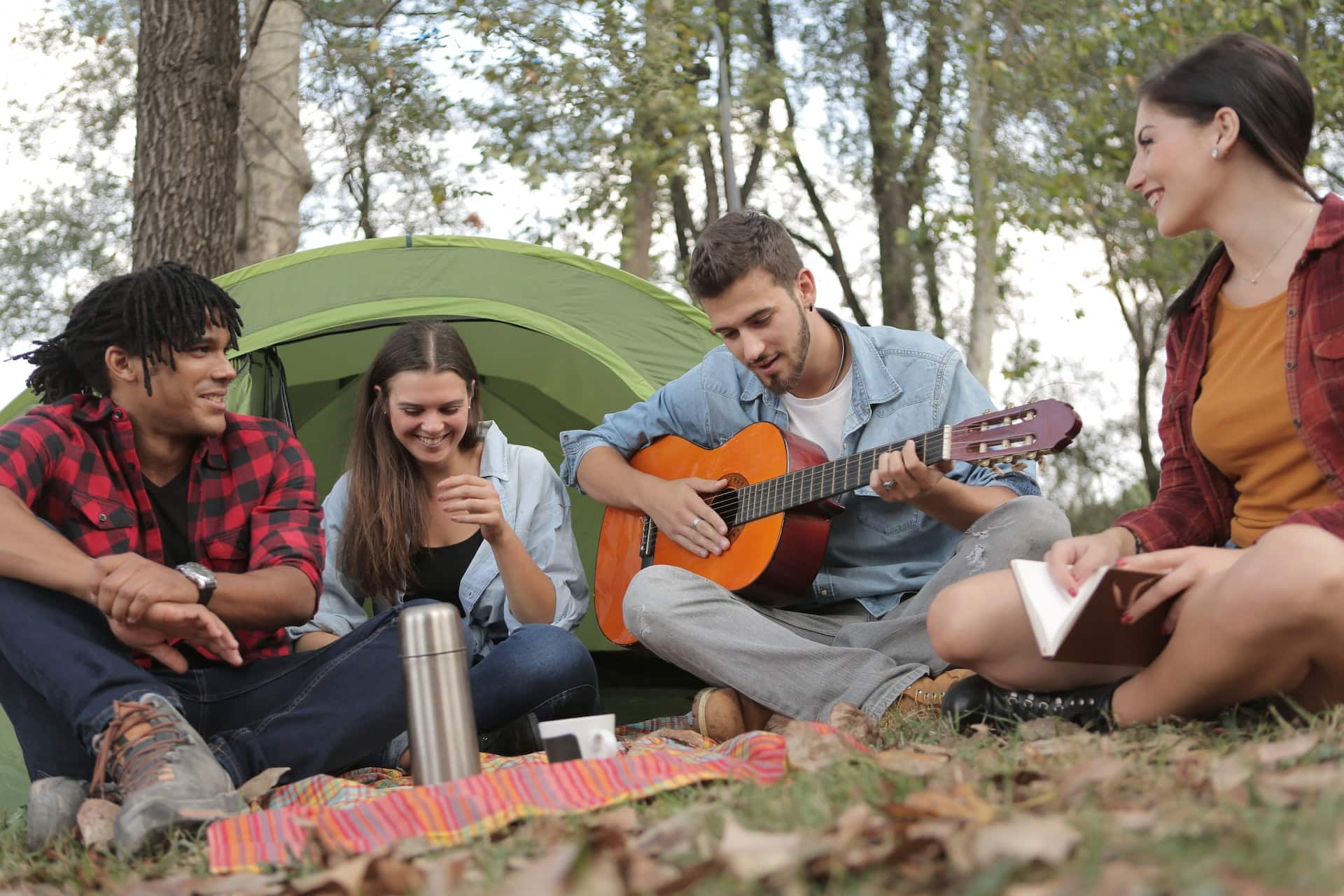
Exploring Nature
- Binoculars for wildlife viewing or stargazing: Enhance your nature experience with a pair of binoculars. Use them for wildlife viewing, birdwatching, or stargazing to deepen your appreciation for the natural world.
- Fishing gear (if applicable): If you’re camping near a lake, river, or stream, consider bringing fishing gear to try your luck at catching dinner or simply enjoying a peaceful pastime.
The key to a stress-free and enjoyable car camping experience lies in thorough preparation and organization. Car camping offers the unique advantage of being able to bring along all the comforts and essentials you and your family might need, making it easier to create a home away from home in the great outdoors. Our comprehensive checklist serves as an excellent starting point for your packing process, ensuring you don’t forget any crucial items. Feel free to customize this list based on your specific needs and preferences to create the perfect car camping experience tailored to you.
As you embark on your weekend adventure, always remember to follow Leave No Trace principles and respect the environment. Preserve the beauty of nature for future generations by minimizing your impact and treating the outdoors with care. By doing so, you’ll not only have a fantastic car camping trip but also contribute to maintaining the pristine condition of the natural world we all cherish.
So, gear up, pack wisely, choose your destination, and use our ultimate car camping checklist to make your next outdoor escape a memorable and hassle-free experience.
